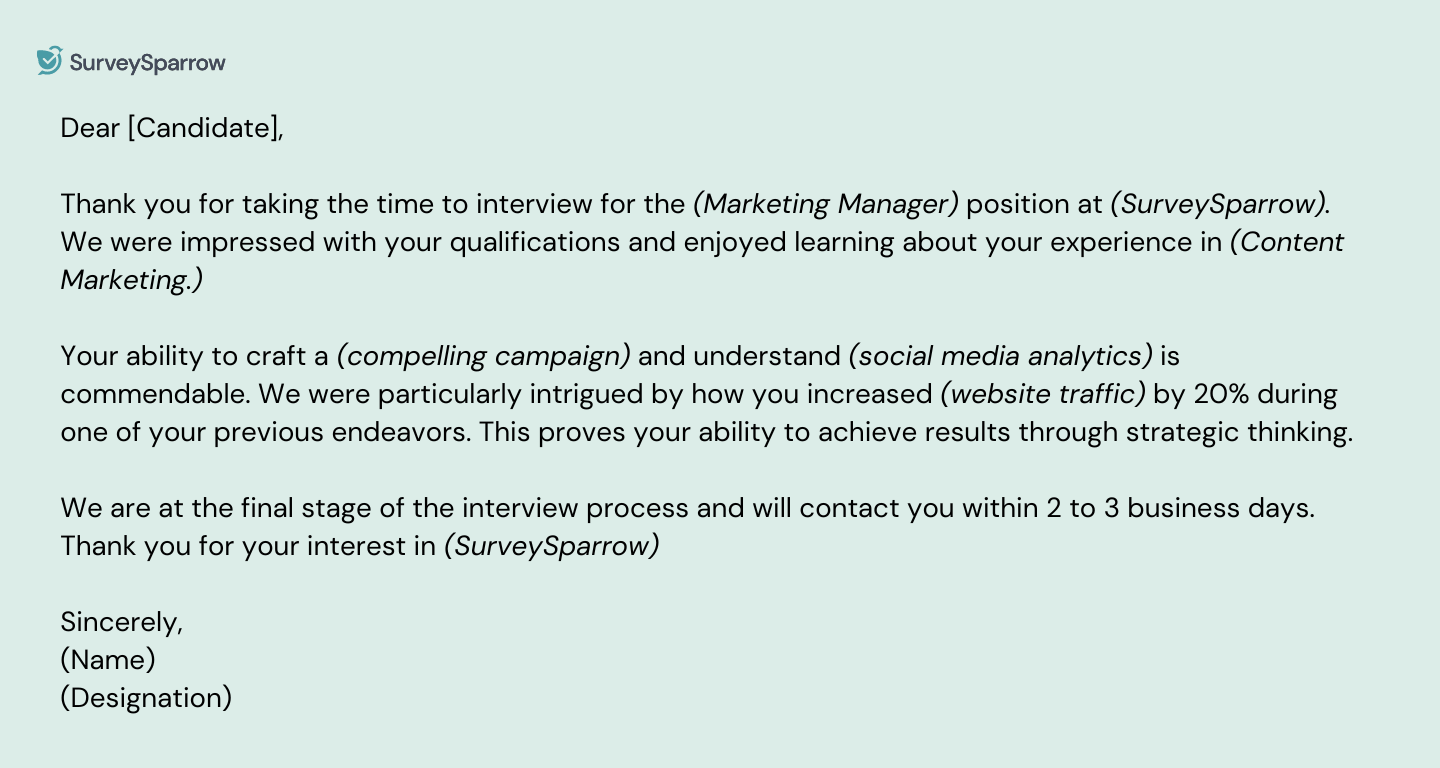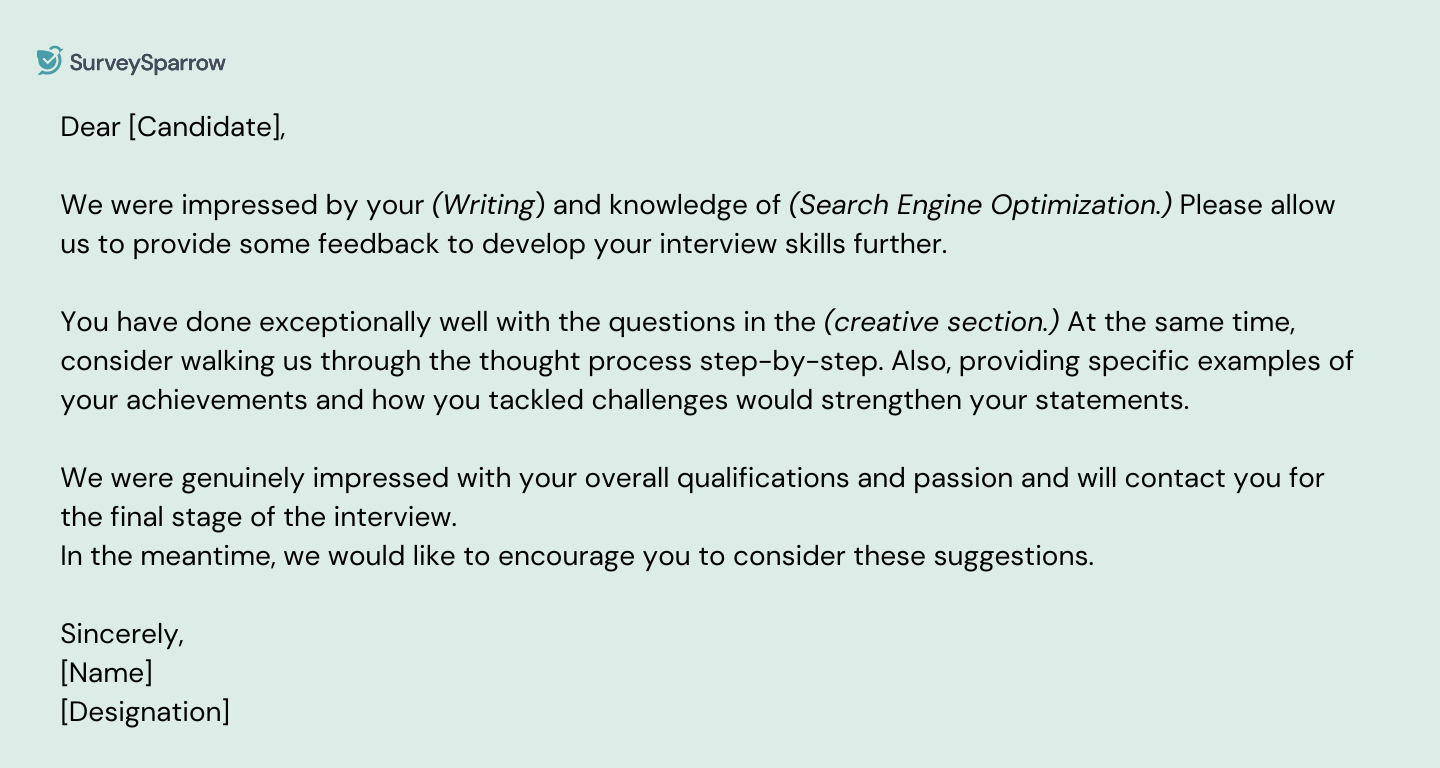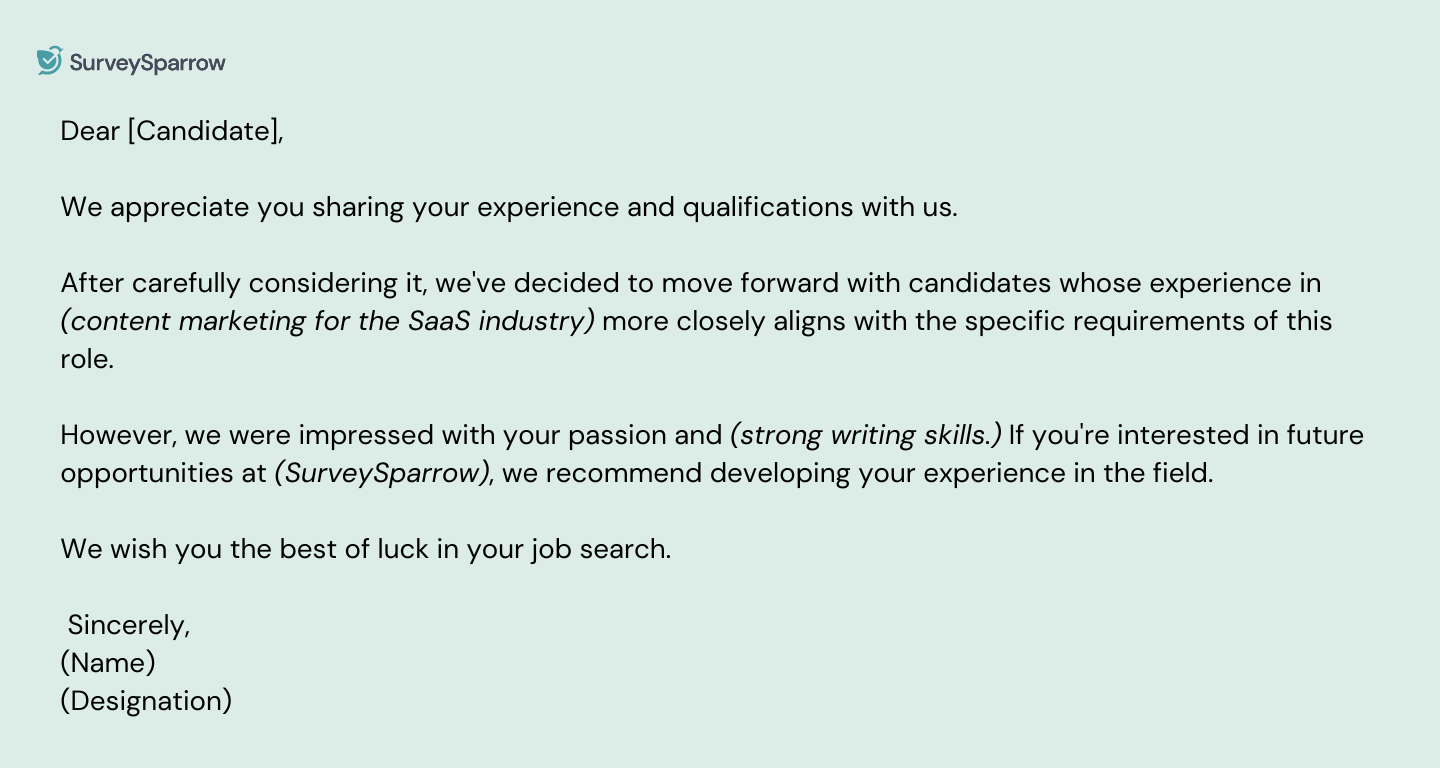Employee Experience
30 Best Interview Feedback Examples (with Benefits and Best Practices)
Article written by Kate Williams
Content Marketer at SurveySparrow
12 min read
19 September 2025

60-Seconds Summary:
The right feedback can leave a lasting impression on a candidate's experience with your company—whether they're hired or not.
Research shows 94% of candidates want interview feedback, yet only 41% ever receive it. This gap represents a massive opportunity for your employer brand.
This blog will talk about the types of feedback an HR should master, the must-haves while collecting feedback and some example templates.
Remember, candidates who receive thoughtful feedback are 4 times more likely to consider your company again.
Keep reading to start with better feedback today.
You’ve just wrapped up a series of interviews, taken detailed notes on each candidate, and now face the mounting task of writing feedback that’s both honest and helpful. How do you deliver your thoughts effectively without causing confusion or disappointment? The answer lies in structured, thoughtful feedback—and this comprehensive guide provides everything you need.
Before that, we have a few things to clear.
Hey, feel free to jump ahead to the section of your choice:
- What is Interview Feedback?
- Interview Feedback Best Practices to Follow
- 30 Best Interview Feedback Examples
- Benefits of Providing Interview Feedback
- Tips To Ask Feedback From Candidates
For the rest of us…
Off we go!
Oh, and I have added a free template that you can use. Feel free to try it out.
What is Interview Feedback?
Interview feedback provides deep insights into a candidate’s performance, skills, and areas for improvement. It is shared once the employer has evaluated all aspects of the candidate’s performance after the interview.
Now, providing feedback is crucial for many reasons. Firstly, it provides closure. If you have given an interview, you know how nerve-racking it is to wait for a response. So, be prompt with it.
Secondly, it helps the candidates enhance their skills and build confidence. Lastly, prompt and accurate feedback reflects the company’s values and shows your transparency.
Now, feedback must go both ways. It is equally important to seek feedback on an interviewee’s experience. These insights will help you improve and advance as a brand. Rolling out a post-interview feedback survey will be of a huge help to you.
Here’s a free survey template made with SurveySparrow that you can consider. Feel free to customize it if you like.
Candidate Experience Survey Template
Use This TemplateInterview Feedback Best Practices
There are a few things you must follow as an employer. While giving feedback, you have to…
- Be prompt with the timing. Just put yourself in the shoes of a candidate waiting for a response. Don’t keep them waiting!
- Be specific with the feedback. Don’t give vague answers that might confuse people. Also, keep it short and to the point. It would be best if you did not beat around the bush.
- Transperency is key. This is a continuation of the above point. It is important to avoid giving false hopes.
- Also, gather the opinions of all the interviews, if there are multiple.
Read More: 20 Gracious Responses for Customers and Colleagues
Now, there are a few things a candidate should also follow after an interview.
- Following up after an interview: Candidates usually shy away from reaching out. There are also instances where multiple follow-up emails are sent in a row. Both should be avoided. They can nudge the hiring officials with a thank-you note and mention their openness to feedback.
- Ask questions: It is essential to clarify questions about the interview process.
- Take it as a learning experience: Whether the interview is successful or not, each gives you something new. Reflect and point out your key strengths and weaknesses from your previous feedback. Also, see how much you have improved.
Now, let’s look at a few examples…
30 Expert Interview Feedback Examples
We’ll explore two categories here…
If you want to create an interview feedback survey, all by yourself, SurveySparrow can help you. The drag-and-drop builder is pretty easy to use! And when in doubt, the AI Survey maker can craft one for you in seconds! You can roll them out to the candidates right after the interview via multiple channels, including WhatsApp, Slack, SMS, or any of the social media platforms!

Let’s start with the first set:
Interview Feedback Examples Based on Type of Response
Feedback must be sent within a week of the interview while the experience is fresh in the candidate’s mind. There are three types of feedback- positive, constructive, and negative.
i. Positive Interview Feedback Examples
The goal is to highlight their skills, knowledge, and positive qualities. Here are some of the feedback phrases that you can use after a successful interview:
- “Your communication skills were excellent. You expressed yourself clearly with enthusiasm. You were also a great listener and actively engaged in the conversation.”
- “It was clear that you had done thorough research on our company before attending the interview. You asked insightful questions and clearly understood your roles’ requirements.”
- Now, say you asked them to solve a hypothetical problem. “The way you approached the hypothetical situation was commendable. You were able to think critically and provide a well-reasoned solution.”
- “During the conversation, you made it clear that you have good collaboration skills and how much you value teamwork. The experience you shared is awe-inspiring.”
- “Your technical skills (like coding) are remarkable. You have a good grasp of the basics and answered all the questions confidently.”
So, what are some examples of positive interview feedback that you have received? We'd love to add them to this list!
Positive interview feedback email example for HR Professionals:

ii. Constructive Interview Feedback Examples
Constructive feedback is more like actionable advice. You provide insights into the areas where the candidate can work on and improve. This type of feedback can be sent even if you have decided to hire or reject the individual. The opportunity to improve is the highlight here.
Here are a few examples:
- “Your responses were well thought out, but sometimes they seemed brief. You should try to elaborate your answers and talk about your experiences in detail.”
- “You mentioned some impressive skills you acquired throughout the interview. To further validate your statements, you should have added more about the specific achievements.”
- “Though your resume is impressive, it would be beneficial to alter it according to the post you are applying to.”
- “Your career goals seemed a bit broad. It is important to provide a clear picture of your long-term aspirations so that we can understand how this role aligns with your personal development.”
- “You answered the questions professionally. But your demeanor could have conveyed some enthusiasm for the role.”
Constructive Interview Feedback Email Example

iii. Negative Interview Feedback Examples
Providing negative feedback can be a challenging conversation. Negative feedback is usually sent after unsuccessful interviews. Here, the goal is to be honest and let the candidate know they are not the right fit for the role without hurting or sounding rude. You have to be respectful and sensitive.
- “While your enthusiasm for the role is appreciated, your skill set does not align with the requirements for this position.”
- “The interview revealed a gap in the technical skills in (specific skill.) Consider focusing on developing your expertise in this area.”
- “The salary expectations you have mentioned are outside the range we budgeted for this role.”
- “While you possess strong skills, your work style might not fit the fast-paced company culture.”
- “Unfortunately, the references provided do not fully support your qualifications, as you mentioned in the interview.”
Negative Interview Feedback Email Example

Now, let’s look at the phrases in specific instances…
Feedback Examples Based on Specific Candidate Attributes
I have categorized this into:
Off we go!
Behavioral Feedback Examples
This focuses on the candidate’s actions, responses, and overall impression.
- “While you answered the questions, there was limited eye contact. Maintaining good eye contact displays confidence and attentiveness during a discussion.”
- “Your listening skills are commendable. You actively attended to our questions and asked clarifying questions before responding.”
- “During the interview, you maintained a good posture, and your body language conveyed confidence.”
- “While discussing your previous job experiences, you were quite critical of your former employer. It is always better to focus on what you learned and how the company impacted you rather than negativity.”
- “You showed great enthusiasm and passion for this role. Even though you took some time to answer technical questions, your commitment impressed us.”
Skill Based Feedback
The feedback is based on the specific skills required for the role. This can include technical abilities, soft skills, and competencies.
- “Your coding skills were impressive, especially your proficiency in (JavaScript.) The way you walked us through your previous projects showed your expertise in the area.”
- “You displayed strong problem-solving skills, but it would have been helpful if you had elaborated on your thought process during the interview.”
- “The interview revealed that you lack time management skills. Highlighting specific examples of how you prioritize tasks and manage deadlines.”
- “We understand that you prefer a more independent working style. This role required strong collaboration with various teams.”
- “Your passion for the SaaS industry was evident throughout the interview. This enthusiasm is a strong fit for our company culture.”
Communication-Based Feedback
Here, the focus is on verbal and non-verbal communication.
- “Your ideas were a bit unclear. Focusing on organizing your thoughts and then expressing yourself concisely will help.”
- “Throughout the interview, you were attentive and maintained good eye contact. Your positive body language displayed professionalism.”
- “There were instances where your tone seemed overly pessimistic while discussing your past work experiences.”
- “Your overall communication style was polite and respectful. You asked clarifying questions and displayed active listening skills.”
- “Your vocabulary was impressive. It made an impression that you have a strong command of the language and knowledge of the relevant field.”
Benefits of Interview Feedback
Now that we’ve seen the different types of feedback and their examples, you must understand why you must make this much effort.
- It helps in professional growth. By providing feedback, you are giving the candidates a chance to improve and do better in the future.
- Improves communication and transparency. Feedback, both ways, encourages open communication. A sense of trust and loyalty can be built upon this.
- It helps in skill development. By pointing out areas for improvement, you give candidates a chance to focus on specific skill sets.
- Enhances candidate experience. Whether it is a successful or unsuccessful interview, constructive feedback provides a positive experience.
Let’s end this with one more question….
How To Ask Feedback From Candidates
As we mentioned above, feedback goes both ways. Feedback from candidates helps a company improve. It will also help you enhance future recruitment experiences.
Here’s what you need to do…
- Take a proactive approach. Also, let them know beforehand that you want to learn about their interview experience.
- Create a personalized survey with open-ended questions. You can use SurveySparrow to roll out engaging surveys. The platform lets you create, collect, visualize, and analyze data. Plus, there are 1000+ pre-designed customizable templates.
- You can also choose to keep the responses anonymous. This will guarantee honest feedback.
- Lastly, time it right! Make sure you do this within a few days after the interview. Perhaps you can try to attach it with the feedback you send. The goal is to reach the candidate while the experience is still raw.
You can use the free candidate experience survey template I attached above or create one from scratch with the drag-and-drop builder. As mentioned before, you also have AI surveys to help you, so don’t worry!
Why don’t you take the platform for a free spin?
That’s about it! Let’s officially
What to Avoid When Giving Interview Feedback
Giving interview feedback requires caution. It aims to help, but feedback that's not handled well can damage your image, put off candidates, or create confusion. To make your feedback valuable and well-accepted, you need to be considerate and unbiased.
Common mistakes to avoid:
- Being unclear: Don't make vague statements like "You're not the right fit." Be specific and clear (without being mean).
- Getting too personal: Stick to the candidate's abilities and background, not their character or looks.
- Using unfair words: Keep things neutral and professional. Avoid words that might sound like discrimination.
- Waiting too long: Quick feedback helps more than late responses. Try to share thoughts within a few days.
- Making empty promises: Don't give false hope or say "we'll stay in touch" unless you plan to follow up.
- Giving no feedback at all: Saying nothing leaves job seekers guessing—and can harm your company's image over time.
Implementing Feedback
You now have these examples and best practices. Following this, you’re now ready to transform your interview feedback process. Here’s your action plan:
Develop feedback templates based on the examples provided, customized to your organization’s voice and values.
Establish a consistent timeline for providing feedback—ideally within 3-5 business days after interviews.
Create a candidate feedback survey to gather insights about your interview process.
Train your hiring team on delivering effective feedback, emphasizing both constructiveness and legal considerations.
Measure the impact of your improved feedback process through candidate satisfaction metrics and quality of hire indicators.
Wrap Up!
Use these interview feedback examples in your emails to create a positive candidate experience. You can help them hone their skills and be better prepared for future instances by providing actionable suggestions.
Ready to elevate your interview feedback? Start by implementing these examples in your very next candidate communication. The positive impact on your hiring process and your reputation will be immediate and lasting.
Remember that feedback is a two-way street! It helps both the candidate and the employer. Use it effectively!
Happy Exploring!

Get upto 40% more responses on your employee surveys. Start your free trial today!
Kate Williams
Frequently Asked Questions (FAQs)
You should be specific and keep it short. Focus on behavioral or specific skill feedback. Also, refrain from overly criticizing the candidate.
No, not always. If you feel the candidate is not the right fit, a simple thank you for the time would be sufficient. However, if you want to share some points, craft them as constructive feedback.
Each medium has its place depending on the situation:
- Email: Best for initial candidates or early-stage rejections; provides written record
- Phone: Ideal for final-stage candidates; allows tone modulation and immediate questions
- Video: Most appropriate for internal candidates or when building long-term relationships
For senior positions or final candidates who invested significant time, a personal call demonstrates respect that enhances your employer brand.
Related Articles

Employee Experience
7 Effective Employee Retention Strategies to adopt
15 MINUTES
20 March 2021

Employee Experience
12 Powerful Exit Interview Questions HR Pros Swear By
12 MINUTES
24 September 2018

Employee Experience
60+ Must Ask 360 Review Questions For Performance Evaluation
17 MINUTES
30 June 2022

Employee Experience
10 Employee Satisfaction Survey Examples (With Questions And Tips!)
19 MINUTES
19 January 2026
